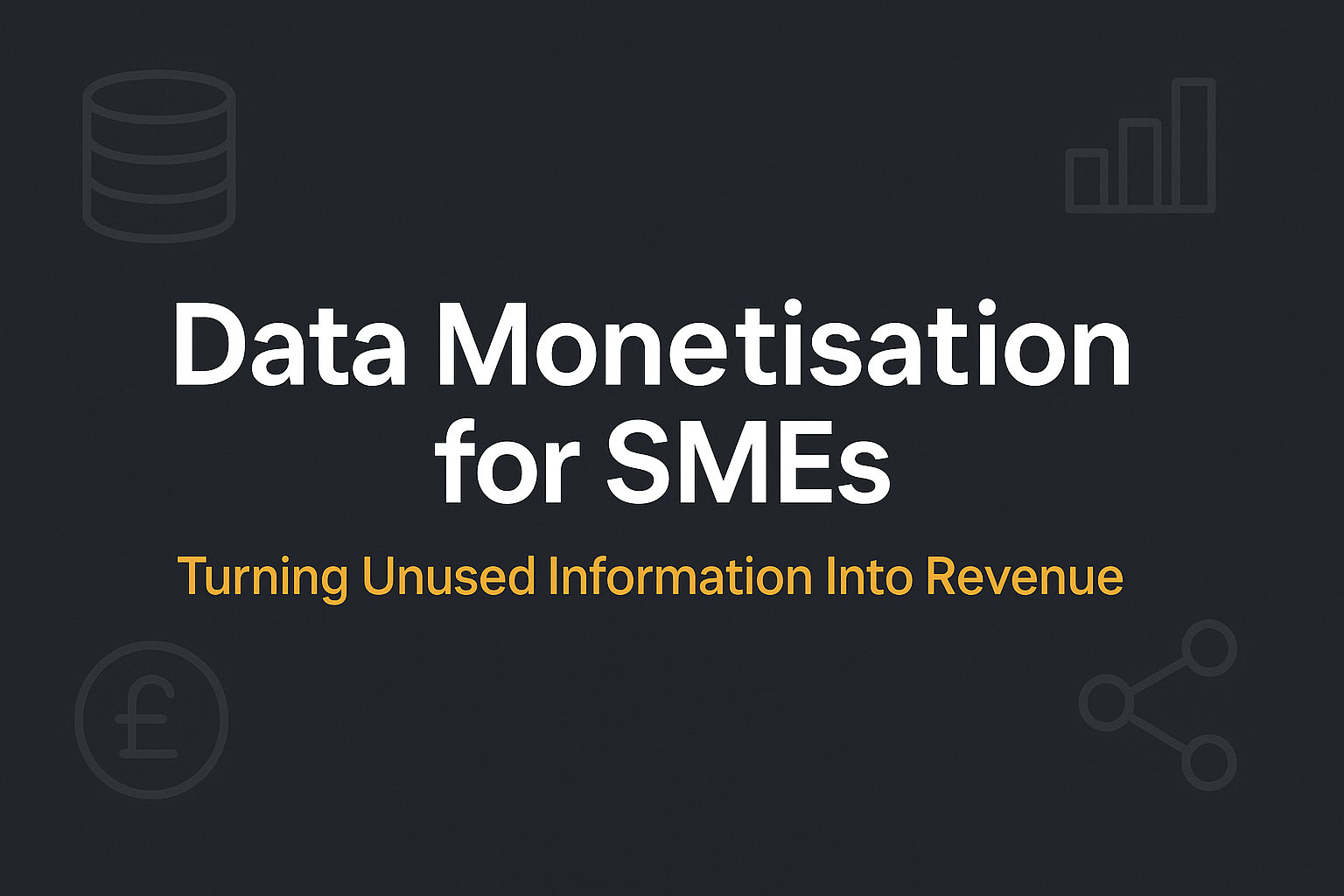Every SME generates data daily — from customer behaviour and sales patterns to supply chain activity and employee workflows. Yet for most, this information sits unused. The result? Missed opportunities for revenue and efficiency.
The good news: data isn’t just an asset for big tech. SMEs can monetise their own information responsibly, provided they balance privacy with commercial opportunity.
Why SMEs Ignore Data Monetisation
What most SMEs assume
Data monetisation means selling customer data to third parties. That feels risky, so they avoid it entirely.
What effective SMEs know
Monetisation isn’t only about selling data externally. It’s about turning insights into revenue streams internally and externally. For example:
- Internal gains: Better demand forecasting, smarter pricing, and reduced waste.
- External opportunities: Aggregated insights shared with partners or anonymised benchmarks for suppliers.
Related reading: Why Most eCommerce Dashboards Are Lying to You.
Internal Monetisation: The Low Hanging Fruit
- Pricing Intelligence
Use sales and competitor data to optimise pricing. Even small adjustments compound into significant margin improvements. - Operational Efficiency
Analyse stock and delivery data to reduce bottlenecks. For instance, identifying which SKUs create costly returns. - Customer Retention
Apply churn prediction to lifecycle data. The cost savings from retention often outweigh the value of new customer acquisition.
These internal wins build confidence before exploring external revenue streams.
External Monetisation: Opportunities With Care
SMEs often underestimate the value of their aggregated insights. For example:
- Retailers: Anonymised sales data can inform suppliers about seasonal demand.
- Hospitality: Guest behaviour data can be packaged into trend reports.
- Services: Benchmark reports across industries can attract sponsorship or subscription fees.
However, external monetisation comes with risk. Privacy, consent, and transparency must lead the way. Mishandling this can erode trust faster than it builds revenue.
As USDSI notes in its data analytics outlook for SMEs, small businesses that balance data innovation with customer trust will gain a competitive edge.
Privacy and Trust: The Non-Negotiables
- Consent first mindset: Customers must know how their data is used.
- Anonymisation: Ensure external reports cannot trace back to individuals.
- Governance: Appoint someone accountable for data ethics, even if part time.
- Transparency: Communicate value — e.g., “we use data to improve delivery speed.”
Trust is currency. Without it, any short term monetisation risks long term damage.
A Framework for SMEs to Start
- Audit Your Data
List what you collect: sales, customer, operations, supply chain. - Segment Internal vs External Opportunities
Start with retention and efficiency before moving to aggregated insights. - Pilot a Low Risk Monetisation Test
Example: build an anonymised benchmark report for a supplier. - Measure ROI and Trust Impact
Track financial gains alongside customer sentiment and retention.
FAQ
- Do SMEs need expensive BI tools to monetise data?
- No. Start with GA4, Excel, or low-cost BI tools to prove value before you upgrade.
- Isn’t selling data unethical?
- Selling identifiable data is risky and often non-compliant. Focus on anonymised insights and internal improvements.
- How quickly can data monetisation show returns?
- Internal use cases like pricing and retention can show results within months; external reports take longer.
- What’s the biggest risk?
- Loss of customer trust. Put consent, anonymisation, and governance first.
Conclusion
SMEs don’t need to be data giants to benefit from monetisation. By starting with internal efficiency, moving into anonymised insights, and keeping privacy at the core, unused data can become a genuine growth lever.
Want help finding the value in your data? Book a discovery call and let Mostly Grey Digital show you where the revenue streams are hiding.
Key Takeaways
- Data monetisation isn’t just about selling information.
- Internal wins (pricing, efficiency, retention) are the easiest entry point.
- External monetisation requires anonymisation and strong trust measures.
- SMEs can start small with low risk pilots.
- Trust is the currency that underpins all data monetisation.

